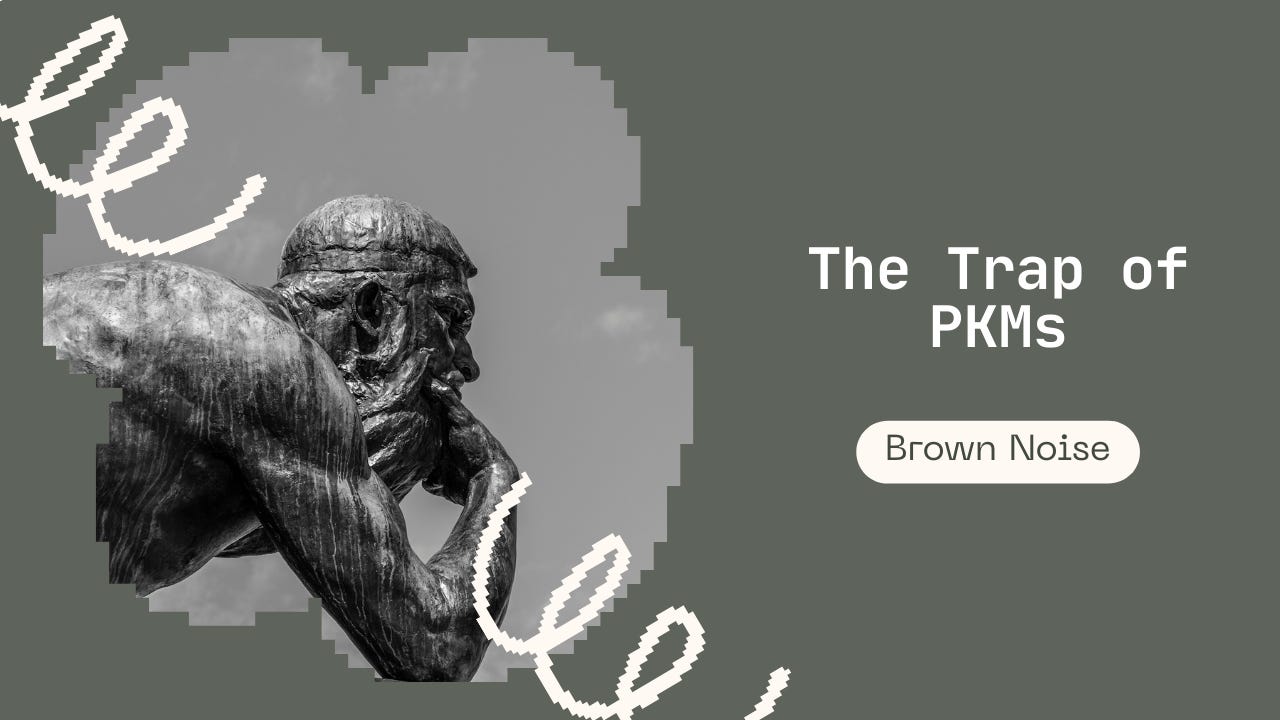The Trap of PKMs
In trying remember everything, we out-source the act of reflection
The “second brain” phenomenon has quickly become a cornerstone of modern productivity culture. Popularized by Tiago Forte, it promises freedom from the limits of memory.
Capture, organize, revisit, repeat. At best, a PKM is a scaffold for memory. And it’s true, there are certain things that a PKM is invaluable at, such as keeping track of sources and storing project notes.
However, an efficient knowledge system tempts us toward excess.
The para-academic search for more and more knowledge to feed into a web of information operates like a siren call, promising mastery through accumulation, but often pulling the individual into endless cataloging and tagging rather than genuine understanding.
The Unthinking Archive
And therein lies the danger: no matter how sophisticated your Notion or Obsidian pipeline is, it doesn’t think for you.
In trying to remember everything, we outsource the act of reflection. — Westenberg
A second brain can store knowledge, but it can’t metabolize it. The act of reflection, synthesis, and application still happens in your biological God-given brain. Without a reader, a library collects dust.
Saving a clever idea doesn’t mean you can wield it. Highlighting a line in a book doesn’t mean you’ve memorized it.
The cognitive error of Productivity as Performance
Productivity as Performance is the belief that by naming a goal or capturing an idea, you’ve taken a meaningful step toward understanding or achievement.
You feel good if you write down “learn rocket science” on your to-do list or if you save an article to your read later list. Watching a million videos on how to program won’t make that app idea suddenly appear.
Unless you wrestle with an idea by rephrasing, applying, or questioning it, you remain no closer to deploying it when it matters. Any idea worth its salt requires action.
When a PKM helps and when it doesn’t
A PKM is a tool, not an end. If you never visit an idea again, then you might as well have never had the idea in the first place.
Where it shines
Supports active projects: Notes tied to real work are much more likely to be revisited.
Extends working memory: Writing down tasks, drafts, or evolving ideas relieves mental load.
Where it falls short
Becomes an end in itself: Collecting for collecting’s sake rarely pays off. It leads to shallow familiarity.
Consumes your time: There are endless guides online on how to make the “perfect” PKM with whatever the hottest new software is. Spending hours crafting a system doesn’t get you closer to your goal.
Escaping the Trap
To keep your second brain useful rather than oppressive, a few principles help:
Reflect before you save: Why are you really saving this tidbit of info? Why does it matter? If it does matter, can you rephrase it for your own personal use?
Minimalism: Err on the side of saving less. Don’t have the same idea rehashed a hundred different ways. Find what resonates with you and discard the rest.
Prioritize living knowledge: Focus on material relevant to your current work. As tempting as it is, don’t create a full breakdown on something irrelevant to your current life scenario.
A Final Reminder
As with many good things, moderation is key. A second brain can be liberating when constraints are applied. It can help us manage complexity. But it is not a mind, and it never will be. The system is a tool. The thinking and action are our responsibility.
The second brain may collect the colors, but only the first brain can paint the picture.


